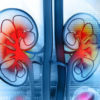Rheumatoid Arthritis Treatment Near You in New Jersey
 Rheumatoid arthritis is an autoimmune condition that causes chronic pain and stiffness throughout the body. This pain can be debilitating, getting in the way of work, household tasks, and favorite activities. If a patient is struggling with symptoms of rheumatoid arthritis, they can seek help at Bergen Medical Associates. Based in northern New Jersey, our multi-specialty team of over 40 board-certified practitioners includes rheumatologists who provide rheumatoid arthritis treatment to help patients maintain a high quality of life.
Rheumatoid arthritis is an autoimmune condition that causes chronic pain and stiffness throughout the body. This pain can be debilitating, getting in the way of work, household tasks, and favorite activities. If a patient is struggling with symptoms of rheumatoid arthritis, they can seek help at Bergen Medical Associates. Based in northern New Jersey, our multi-specialty team of over 40 board-certified practitioners includes rheumatologists who provide rheumatoid arthritis treatment to help patients maintain a high quality of life.
What Is Rheumatoid Arthritis?
Rheumatoid arthritis is an autoimmune disease that affects the synovium, the tissue lining surrounding a joint. The synovium is responsible for producing fluid to help the joint move smoothly. When attacked, this tissue becomes thickened and stops producing fluid, making joint motion painful and difficult.
What Is an Autoimmune Disease?
The immune system is the body’s natural defense mechanism against disease. Its primary agents are immune cells that travel through the bloodstream. These cells are designed to identify and attack foreign substances, like bacteria and viruses, to prevent infection. In some cases, however, immune cells mistakenly identify the body’s tissues as foreign invaders. The immune system attacks these tissues, causing pain and inflammation. This is known as an autoimmune disease.
What Are Rheumatoid Arthritis Symptoms?
Rheumatoid arthritis can affect joints anywhere in the body, though it primarily attacks the hands, fingers, knees, feet, ankles, and toes. Around these joints, patients frequently experience:
- Reddened and tender skin
- Stiffness, especially in the morning or after long periods of sitting down
- Swelling and inflammation
- Aching pain
Rheumatoid arthritis can also affect the skin, eyes, lungs, nerve tissue, heart, and blood vessels. When this happens, the patient experiences additional symptoms besides joint pain. These include:
- Fatigue, or extreme tiredness
- Fever
- Reduced appetite
- Weakness
- Dry or reddened eyes
- Increased light sensitivity
- Loss of vision
- Gum inflammation or irritation
- Dry mouth
- Shortness of breath
- Lung and heart disease
Symptoms of rheumatoid arthritis affect everybody differently. In some patients, pain develops gradually over several years. In others, it comes on suddenly and progresses rapidly. Some patients may experience pain consistently, while others experience periods of intense symptoms, called flares, followed by periods of remission, when symptoms mostly disappear.
What Causes Rheumatoid Arthritis?
The exact cause of rheumatoid arthritis is still unknown. Physicians believe that it may be a combination of genetic, hormonal, and environmental factors that trigger a change in the immune system. Certain infections may also trigger rheumatoid arthritis, especially in individuals who are already at higher risk of the disease. Risk factors for rheumatoid arthritis include:
- Being female
- Being over the age of 40
- Having a family history of rheumatoid arthritis
- Having a family history of other autoimmune conditions
- Smoking, especially over time
- Having a serious gum infection (periodontal disease)
- Being overweight
How Is Rheumatoid Arthritis Diagnosed?
Rheumatoid arthritis is diagnosed by a rheumatologist, or a physician who specializes in autoimmune disorders. The rheumatologist typically begins with a physical exam to evaluate the patient’s symptoms, range of motion, and medical history. They will then request a blood test. This checks for certain proteins, called antibodies, which are produced by a faulty immune system.
Depending on blood test results, the rheumatologist may also wish to do imaging tests. These include X-rays, computed tomography (CT), and magnetic resonance imaging (MRI) scans, which take pictures of the inside of the body. Imaging lets physicians determine the extent of damage caused by rheumatoid arthritis and whether the joints have begun to wear away. This information helps them plan the most appropriate treatment to meet the patient’s unique needs.
What Treatments Are Available for Rheumatoid Arthritis?
While there is no cure for rheumatoid arthritis, there are effective treatments available to help manage symptoms, reduce flares, and protect the joints and organs. Patients can work closely with their Bergen Medical Associates practitioner to explore the best treatment options for their individual needs.
For early-stage rheumatoid arthritis, medication is the first treatment approach. Anti-inflammatory medications can relieve pain and swelling around joints. Immune suppressants may also be used to reduce the damage caused by immune attacks, though they may leave the patient vulnerable to infection. In the meantime, physical therapy may also be recommended to keep joints mobile.
In late-stage rheumatoid arthritis, immune attacks may have already caused significant damage. In this case, surgery might be considered. Joint replacements can restore pain-free mobility in joints that have been badly damaged by rheumatoid arthritis.
Find Rheumatoid Arthritis Relief Near You in New Jersey
Patients struggling with rheumatoid arthritis can find treatment at Bergen Medical Associates. This is a multi-specialty team of over 40 nurses, physicians, and practitioners, delivering state-of-the-art care for patients across northern New Jersey. We have locations near you in Emerson, Montvale, Northvale, Paramus, and Ridgewood, NJ, making it easy to find treatment near you.
To learn more about rheumatoid arthritis treatment or to schedule an initial consultation, request an appointment today.












